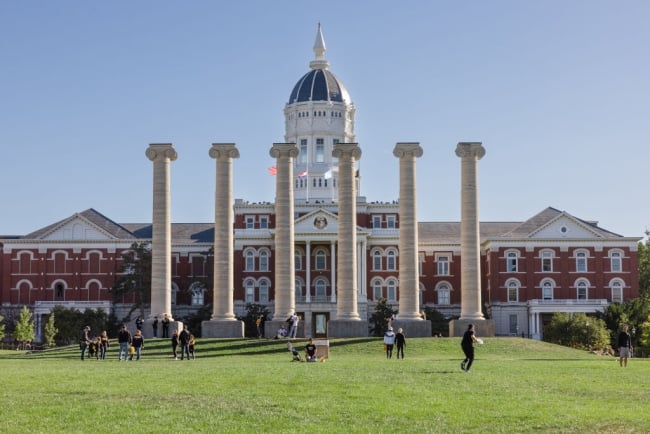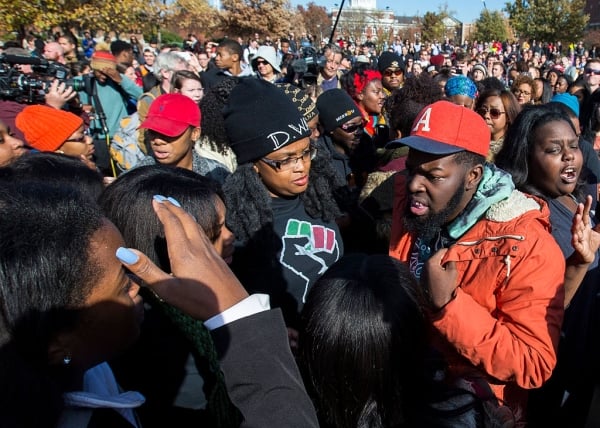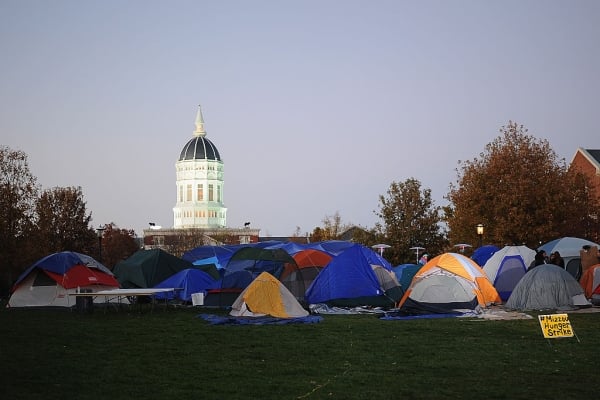You have /5 articles left.
Sign up for a free account or log in.

The University of Missouri campus in Columbia, where leaders dissolved the DEI office this week.
Michael Hickey/Getty Images
The University of Missouri at Columbia is dissolving its Division for Inclusion, Diversity and Equity, leaders announced Tuesday morning, in an effort to pre-empt legislative action from conservative state lawmakers.
The move will decentralize the office’s resources, eliminate the IDE vice chancellor position and disperse existing staff members to other departments across the university—primarily the office of student affairs, for student success roles, and the provost’s office for faculty support roles. The changes go into effect on Aug. 15.
In a press call Friday with university president Mun Choi and outgoing vice chancellor of IDE Maurice Gipson, Choi said the reorganization would allow Missouri to avoid budget cuts from anti-DEI state legislators and steward its own transition to what he saw as an inevitable outcome in a deep-red state.
A few states, including Alabama, Florida and Texas, have passed anti-DEI legislation that has mandated sweeping cuts at public universities. In Missouri, conservative lawmakers have introduced 13 anti-DEI bills in the past two years, a number of which have come very close to passing. Last April the Legislature narrowly removed an anti-DEI amendment from the state budget after contentious debate, and this March lawmakers introduced a new bill to cut DEI spending, though the Legislature ended its most recent session without advancing it.
“We want to ensure we have a positive dialogue with [lawmakers] that support our university,” Choi said. “We believe this offers a sustainable path forward.”
Choi said the university had succeeded in “helping to prevent these bills from passing.” But he also made overtures to Republican arguments against DEI spending, saying that a focus on students and faculty from underrepresented backgrounds unnecessarily excluded others from accessing those resources.
“It’s important that we do not become an institution that excludes in the name of inclusion,” Choi said.
Missouri is the latest red-state public university to cave to political pressure on DEI. The University of Arkansas, which Choi pointed to as a model, dispersed its DEI office last summer, and the University of North Carolina system Board of Governors ordered campus leaders to do the same last month.
Paulette Granberry Russell, president of the National Association of Diversity Officers in Higher Education, said the pattern is concerning.
“I can’t say I’m surprised that Missouri is doing this considering the number of bills introduced there,” she said. “But it’s disappointing that we have institutions who are choosing not to advocate for and stand by their articulated values and mission.”
The IDE office’s dissolution is not the first instance of Missouri undertaking major structural changes at the insistence of right-wing policymakers: Over the past year the university has eliminated all scholarships with racial eligibility criteria to comply with an order from the state’s attorney general, often against the wishes of the donors who endowed the funds.
Unraveling a Hard-Fought Legacy
Missouri established its IDE office eight years ago in response to the 2015 protests over racism on campus that rocked the flagship and the broader higher education landscape. Activists asked for targeted programs to increase Black student enrollment and faculty hiring and resources to support minority students on campus.
Choi became Missouri’s president in 2016, replacing Tim Wolfe, who resigned alongside Chancellor R. Bowen Loftin over their handling of the protests. He entered the role as a fresh face for an administration that had weathered enormous controversy. At last Friday’s press conference, he said that “so much has changed” since then, and that it was doubly important to ensure that “no one is left out” of inclusion initiatives.

Student protesters at the University of Missouri react to news of President Tim Wolfe’s resignation in 2015. Many of the resources they won were undone this week.
Brian Davidson/Getty Images
Missouri has removed positions from the IDE umbrella before: In 2021 the university eliminated leadership roles at five cultural centers as part of a shift away from “holistic identity-based coordinators,” according to messages from university leadership at the time. But the formal end of Missouri’s IDE division is a symbolic milestone in the nationwide political backlash against diversity, equity and inclusion, which has only intensified since the campus protest movement that Missouri students kicked off in 2016.
Gipson joined Missouri at a similarly raw time for campus race relations: In the summer of 2020, when protests over the police murder of George Floyd prompted a nationwide reckoning with systemic racism. While he believes the IDE reorganization will be beneficial in breaking down silos, he’s been disappointed by the cultural tone shift that led to this moment, and which he admitted has made his job at Missouri more difficult.
“When I started in 2020, it seemed a world of possibilities was open to us … Now, people are not as open to those conversations,” he said.
Carrington Peavy, a Missouri junior and the president of the Legion of Black Collegians, said students are incensed at the news. She and other student leaders met with Choi on Friday and were assured that nothing would change for students, only faculty mediation processes. But hours after the announcement, she’d already heard from student organizations that the university asked them to change their names—the group Nurturing Minority Wellness, for instance, was asked to remove the word “Minority.” She expects the university will ask the LBC to do something similar, if not change its membership requirements altogether.
A spokesperson for the university said it never asked for that name change.
Peavy said resources to support Black students specifically are still essential at Missouri, where she sees anti-Black racism on a regular basis—from locals yelling slurs out of truck windows to subtler manifestations from non-Black professors and peers.
We’re not the ones being exclusionary.”
—Carrington Peavy
“We’re not the ones being exclusionary. We didn’t used to be allowed to participate in Homecoming; they used to sing ‘Winn Dixie’ at the Homecoming parade and wave Confederate flags in our faces,” Peavy said, referring to the events that precipitated the LBC’s founding in 1968. “This is a space created out of survival.”
Preservation or Surrender?
For many diversity officers, the backlash to their work over the past few years has been a disillusioning experience. Some have parted acrimoniously with their institutions over perceived political gamesmanship or lack of support; others have been pushed out unceremoniously.
Gipson is leaving Mizzou to lead Philander Smith University, a historically Black institution in Little Rock, Ark. He said the move has nothing to do with the restructuring—though Choi added that they would have eliminated Gipson’s position regardless—and expressed his support for the university’s reorganization plan, which he will help steward.
“President Choi has offered assurances, but change can be anxiety-invoking,” he said. “As we make this shift as an organization, my last task will be to ensure that every student, faculty and staff understands this reorganization and oversee the transition to make sure it’s smooth.”
Choi said one of the university’s goals in restructuring the IDE division was to preserve as many staff positions as possible. Gipson said students and faculty should feel reassured that the advocates they’ve come to trust would still be serving them—just alongside many more students.
“Every staff member who currently works on inclusive excellence, who works with our faculty and staff, will remain here,” he said. “Our stakeholders are going to come and see the exact same people who cared for them [before].”

Tents erected by student protesters at the University of Missouri in 2015.
Michael B. Thomas/Getty Images
Granberry Russell said she hopes Missouri’s restructuring maintains the resources that student, alumni and faculty activists won in 2015. But she finds it difficult not to see the move as part of the broader national backsliding on diversity and equity efforts.
“The roles and offices that are being dismantled were designed to lead and influence and hold the institutions accountable to real change,” she said. “It’s very difficult to be optimistic under these circumstances.”
Peavy said that if her fears come true and the backlash continues, she hopes students react the way they did in 2015.
“A lot more students were prone to action then; I want to bring some of that energy back,” she said. “It can’t be statements on social media anymore. We’re going to have to start doing something else, making more noise, buying some tents … We can’t just lay down and let them bulldoze over us.”
Note: the comment from a university spokesperson regarding the names of student groups has been updated.





